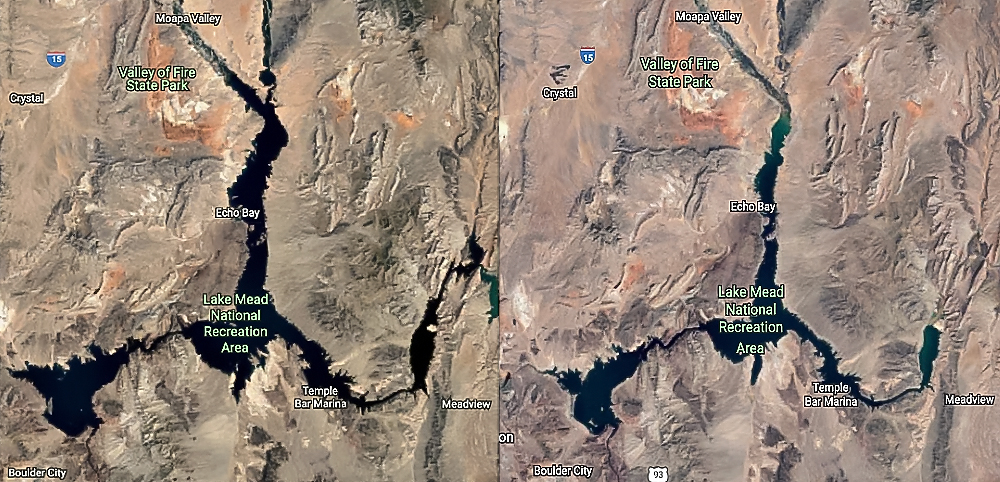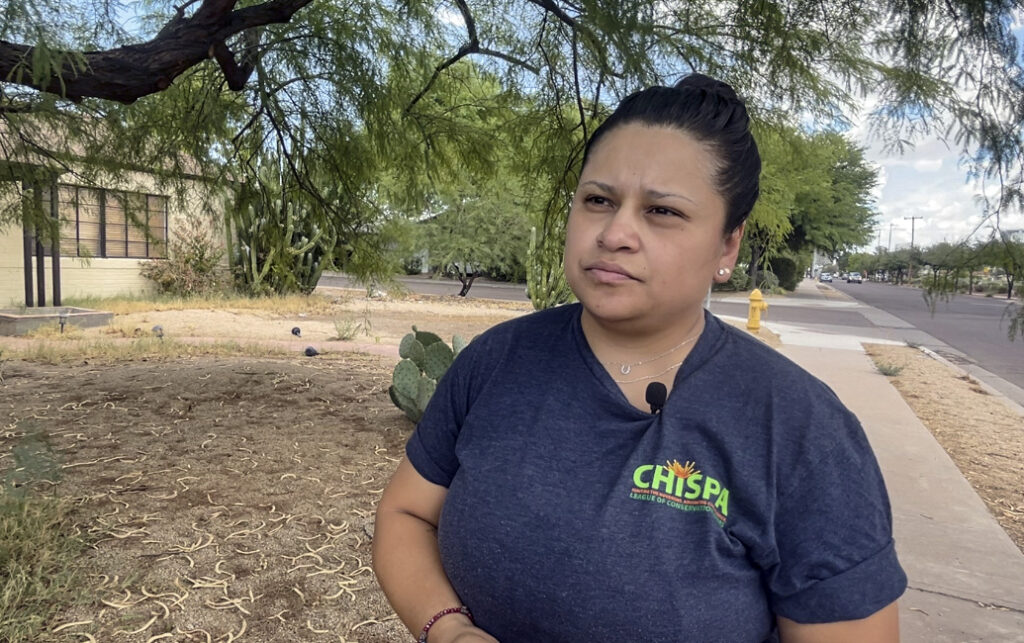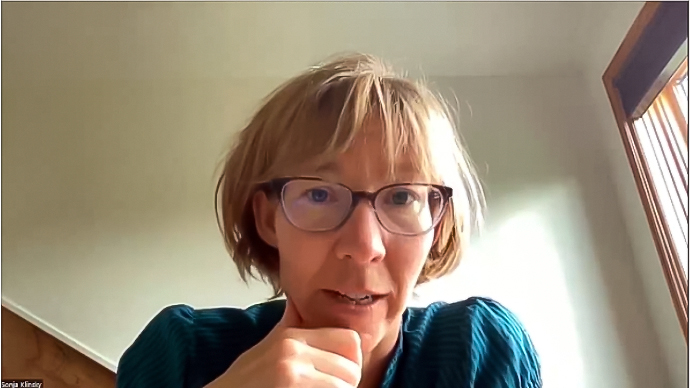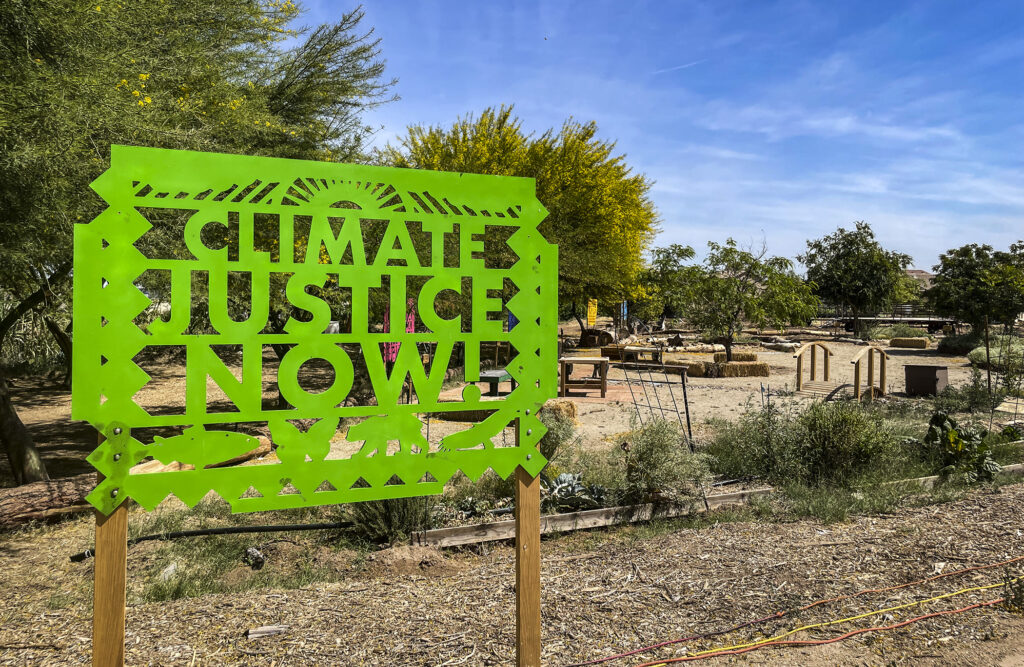As the weather heats up across the country, will climate action too?

PHOENIX – Pita Juarez stood outside her home, sweat dripping from her forehead. It was 2:30 p.m., the sun was blistering as the temperature was expected to climb to 108 degrees that day in July.
As temperatures rise, not all communities are impacted the same. Because of where Latinos live and work in the United State, research shows they are more vulnerable to climate change.
More than half, about 55%, of Latinos live in three states that are already experiencing serious effects related to climate change: historic drought in California, record-breaking heat in Texas, and increased sea level rise and flooding in Florida, according to the nonprofit Environmental Defense Fund.
Latinos are also more likely to work in the industries that are deeply affected by the effects of climate change such as agriculture, manufacturing, and construction. Farmworkers are 20 times more likely than other outdoor workers to die from the extreme heat, Centers for Disease Control and Prevention data show, and Latinos make up around 75% of farmworkers in the country.

“We need to be at the table when we’re talking about what is environmental justice and environmental racism, look for Latinx people,” said Juarez, the National Communication and Creative Strategies Director for CHISPA Arizona. CHISPA is a program for the League of Conservation Voters, an organization that builds political power for people and the planet. Currently, CHISPA has programs in the states of Arizona, Nevada, Colorado and Maryland.
Earlier this year NOAA’s National Centers for Environmental Information released its 2022 State Climate Summaries for all 50 states. In Arizona, among the report’s major findings is a rise in temperature of 2.5 degrees and extended draught, a major threat to the state’s population as well as the environment and agriculture.
“We have already always had challenges due to heat and due to water and unfortunately, the climate predictions suggest that the Arizona region is going to become both hotter and drier,” said Dr. Sonja Klinsky, an associate professor at the School of Sustainability at Arizona State University. Her research focuses on justice issues around climate change and strategizing real-world solutions on climate.
Although this trend doesn’t seem surprising, it is affecting a lot of people in Arizona, especially those who are most vulnerable to heat or are most exposed to heat, Klinsky added.
Another issue that she notes is the critical shortage of water across the Southwest region also worsen by climate change. “That is going to put pressure on all kinds of systems that we take for granted in terms of access to water,” Klinsky said.

States in the Southwest are already subject to water cuts as Lake Mead is losing water at an alarming rate, CNN reported. And states that depend on the Colorado River, which provides water to roughly 25 million people in Arizona, Nevada, California and Mexico, are scrambling for solutions to prevent water levels at their main storage reservoir from getting any lower, according to the Arizona Department of Water Resources.
Juarez said it is important to connect issues like climate change and public health, especially for the Latino community. Already, “Individuals with already weakened cardiovascular systems have a heightened risk of heat-related morbidity and mortality,” according to the CDC.
“Every year we’re getting hotter not only here in Arizona, but all around the country and I always get scared about how many people have their AC on right now and how much that’s taking,” Juarez said.
She fears events like the Texas snow storm that occurred in February 2021 which led to the failure of the power grid resulting in the deaths of 246 people. The electric grid collapsed, leaving at its peak more than 3 million homes and businesses in Texas without power. Juarez says she worries that could occur in Phoenix, but with extreme heat. She argued the only way to prevent such tragedies is by taking action.
“We can prepare ourselves by organizing our people to know that they have a voice that they can make an impact whether that’s the legislature or within their own communities.”

CHISPA Arizona works with communities of color, parents, and youth to prepare them to give testimony at the legislature and the Environmental Protection Agency. The organization wants their members to feel a part of the democratic process and to use their voice to address climate issues that affect them everyday.
Already Hispanics are more likely than non-Hispanic whites to both attribute global warming to human activity and to support action to protect the environment, research shows. Latino support for environmental and health protections is especially high among young Latino voters, 75% of whom believe it is very important for the new President and Congress to aggressively combat climate change.
And according to the Environmental Defense Fund, 85% of Latinos believe it is very important to reduce smog and air pollution.
“We’re always working towards a clean renewable energy, also working towards a better democracy,” Juarez said, “and how are we organizing more Latinx people here in Arizona for climate justice.”
Alexandra Mora Medina graduated from Arizona State University this year and will pursue a master’s degree in bilingual journalism next fall. She’s written about sustainability and voting issues. She’s interested in working as an audio and podcasting reporter. Reach her at mora [dot] alexandra [dot] 17 [at] gmail [dot] com and on Twitter @AlexMoraMedina.